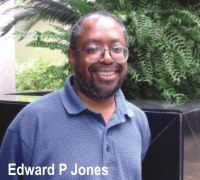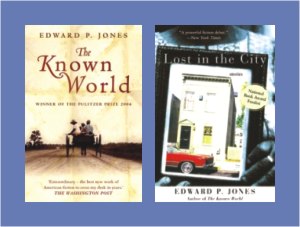|
Interview
A
Writer of the Known World
 Winner
of 2004's Pulitzer prize for his novel 'The Known World',
African American writer, Edward P Jones was recently invited
by the USIS to come to Dhaka and give a few readings and meet
with people including school students, writers and journalists.
In an interview with SWM Jones shares his thoughts on his
motivation to write his first novel and what gets his creative
instincts going. Winner
of 2004's Pulitzer prize for his novel 'The Known World',
African American writer, Edward P Jones was recently invited
by the USIS to come to Dhaka and give a few readings and meet
with people including school students, writers and journalists.
In an interview with SWM Jones shares his thoughts on his
motivation to write his first novel and what gets his creative
instincts going.
AASHA MEHREEN AMIN
It's not
everyday that you get to talk to a Pulitzer Prize winner in
Dhaka. Especially one who doesn't really like to talk much.
But apart from the slight inconvenience of running out of
questions, listening to Edward P. Jones, is an intriguing
experience. Reserved and a man of few words, Jones is unapologetic
about his reluctance to explain his work. He writes because
he wants to, on what he feels like writing about. Which is
why he chose such an unusual story line for his second book
'The Known World' that won him the Pulitzer for 2004.
The backdrop
of the book is a plantation where slaves work and live out
their lives. But the slave-owners are black and the characters--
both black and white-- are complex with many shades of grey.
Jones's first book 'Lost in the City', a collection of short
stories was originally published in 1992 and short-listed
for the National Book Award.
It was
while in college that Jones heard about the fact that in the
1880s there were black slave owners and this bit of fascinating
history got him to visualise a full-scale novel. The story,
says Jones, centres on a 31 year-old black man Henry Townsend
who dies at the very beginning of the novel. He leaves his
widow a retinue of 31 black slaves and the story revolves
around them as well as other characters.
This includes
Henry's mentor William Robbins, a former white slave owner
who sold Henry's freedom to his parents. William sells a piece
of land to Henry along with a slave, Moses. When Henry dies
his wife is at a loss about running a plantation with thirty-one
slaves and begins to depend on Moses. Moses, on the other
hand, tries to get the slaves their freedom. Jones adds that
his book is about a myriad of characters and their complex
relationships with each other. There are rich blacks and poor
blacks, rich whites and poor whites, white people who are
sympathetic towards blacks and those who are blatantly racist,
American Indians and a light-skinned black who could pass
off as white but doesn't want to.
The writer
insists that there are no political messages in the novel
and that his writings are based purely on realism. "That
is what I aim for," says Jones. "They are simple
stories. I don't see why you have to be complex or dense to
tell a story; if you have an agenda then write essays, storytelling
is about human beings," he comments dryly.
Jones
does admit however, that American society is still a divided
one. "People of one class and race live in one place,
people of another class and race live in another." America
is a very complex society. It's not clear cut all the way
down…There are days when I get up and feel that I am
glad to be there and there are days when I feel 'why am I
here?'"
Jones's
own story is as engaging as his fiction. Born on October 5,
1950 and raised in Washington DC, by his mother, a dishwasher
from North Carolina who never went to school, Jones spent
most of his time reading books. Most of his early life was
spent in poverty. He studied English at Holy Cross and later
got his MFA from the University of Virginia. It was while
in college that he started writing seriously, coming up with
his prize-winning short story collection, Lost in the City.
Jones has regularly been published in the New Yorker Magazine.
 Although
it took him about 10 years to complete 'The Known World' Jones
says that he read very little of the enormous amount of research
material he had collected. Thus Jones relied completely on
his imagination, a method that continues to be the main driving
force of his writing. He spent 19 years of his life summarising
business-articles for a magazine, a job that involved little
creativity but paid well enough for him to pursue his real
passion-- writing. Although
it took him about 10 years to complete 'The Known World' Jones
says that he read very little of the enormous amount of research
material he had collected. Thus Jones relied completely on
his imagination, a method that continues to be the main driving
force of his writing. He spent 19 years of his life summarising
business-articles for a magazine, a job that involved little
creativity but paid well enough for him to pursue his real
passion-- writing.
Jones
says that his ideas often come out of the blue. "You
might be buying eggs in the supermarket when you have an image
in your head of a woman in a corn field with blood on her
dress and holding a shotgun…It's not like you read the
headlines in the papers and say to yourself that you will
write about them." The writer adds that usually when
an idea for a story comes to his head he thinks out the whole
story line before he actually begins to put it on paper. But
the rest explains Jones is all hard work. Plus there is no
guarantee that the success of the first book will automatically
get transferred to the second one. "Every book has its
own life." His favourite writers include James Joyce
and Anton Chekov. Jones says that he enjoys watching movies
and is particularly fond of Satyajit Rays films.
Jones's
working regime includes getting up as early as 6:30 a.m. when
the 'sun is still fresh' as well as the mind. He says that
if he wakes late, say 9a.m then the whole day is wasted unless
of course he is at the end of a book or story in which case
he will go on until it is finished.
As a person
Jones is not much of a social butterfly and prefers to keep
to himself rather than go to a café to make intellectual
chitchat with writers over latte, as he puts it.
Jones
believes that for writers there is no end to learning. "It's
always a learning process," says the no-nonsense writer
who says that winning the Pulitzer was a big surprise: "I
never take myself too seriously."
Copyright
(R) thedailystar.net 2005
| 